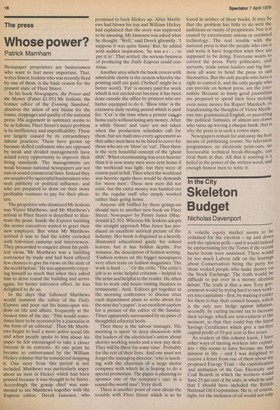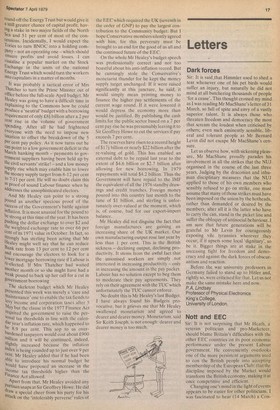Skeleton Budget
Nicholas Davenport
A volatile equity market seems to be ordained for the election — up and down with the opinion polls — and it would indeed be embarrassing for the Tories if the recent hectic boom were sustained. There would be too much Labour talk on the hustings about Conservatives being the party for those wicked people who make money on the Stock Exchange. The truth would he difficult to put over in a stormy election debate. The truth is that a new Tory government would be trying hard to turn workers into capitalists— first, by making it easier for them to buy their council houses, which is the only sure hedge against inflation, secondly, by cutting income tax to increase their savings, which are non-existent at the moment, so that they could buy the latest Savings Certificates which give a tax-free capital profit of 50 per cent in five years. As readers of this column know, I have other ways of turning workers into capitalists — this seems to have become my final mission in life — and I was delighted to receive a letter from one of them about mY proposed Energy Trust — the capitalisation and unitisation of the Gas, Electricity and Coal Boards in which the workers would have 25 per cent of the units, in which he said that I should have included the British National Oil Corporation. He is, of course, right, for the inclusion of oil would not only round off the Energy Trust but would give it a still greater chance of capital profit, having a stake in two major fields of the North Sea and 51 per cent of most of the concessions. Incidentally, I would expect the Tories to turn BNOC into a holding comPany not an operating one which should ensure profits and avoid losses. I can visualise a popular market on the Stock Exchange in the units of the national Energy Trust which would turn the workers Into capitalists in a matter of months.
It was probably a tactical error of Mrs Thatcher to turn the Prime Minister out of office before the full-scale April budget. Mr Healey was going to have a difficult time in explaining to the Commons how he could Produce a 'neutral' budget with a borrowing requirement of only £84 billion after a 2 per cent rise in the volume of government sPending. After all he had frightened everyone with the need to impose new taxation to offset the breakdown of the 5 Per cent pay policy. As it now turns out he can Point to a low government deficit in the March banking month payments to government suppliers having been held up by the civil servants' strike! and a low money suPply rise which may enable him to lower the money supply target from 8-12 per cent to 7-11 per cent. He will no doubt claim this as proof of sound Labour finance when he addresses the unsophisticated electors.
And Mr Healey can point to a strong Pound as another specious proof of the !access of the Government's battle against Inflation. It is most unusual for the pound to be strong at this time of the year. It has been Pushing the dollar exchange to over $2 and the weighted exchange rate to over 66 per Cent of its 1971 value in October. In fact, so stron-i g y has sterling been acting that Mr nealey might well say that he can reduce Rank rate from 13 per cent to 12 per cent and encourage the electors to look for a lower mortgage borrowing rate if Labour is re-elected. If Mrs Thatcher had waited another month or so she might have had a Weak pound to back up her call for a cut in government borrowing The skeleton budget which Mr Healey Presented this week was merely a 'care and Maintenance one to enable the tax fiends to Levy income and corporation taxes after 5 May but the clause in the 1977 Finance Act required the government to raise the personal tax thresholds in line with the calendar year's inflation rate, which happened to he 8.9 per cent. This sop to us overburdened taxpayers would cost about £900 Million and it will be continued, indeed, !lightly increased because the inflation index is being rounded up to just over 9 per cent. Mr Healey added that if he had been able to introduce his normal budget he Would have proposed an increase in the n.come tax thresholds higher than the rinance Act allowed.
Apart from that, Mr Healey avoided any Partisan snaps at Sir Geoffrey Howe. He did draw a special cheer from his party for his attack on the 'intolerably perverse' rules of the EEC which required the UK (seventh in the order of GNP) to pay the largest contribution to the Community budget. But I hope Conservative members silently agreed with him, for this perversity must be brought to an end for the good of us all and the continued future of the EEC.
On the whole Mr Healey's budget speech was professionally correct and not too boastful about his anti-inflation record. But he cunningly stole the Conservative's monetarist thunder for he kept the money supply target unchanged. If it were raised significantly at this juncture, he said, it would simply mean printing money to finance the higher pay settlements of the current wage round. If it were lowered it would depress the economy more than would be justified. By publishing the cash limits for the public sector based on a 7 per cent pay rise he was presumably leaving it to Sir Geoffrey Howe to cut the services if pay exceeds 7 per cent.
The reserves have risen to a record height of $174 billion or nearly $22 billion after the re-valuing of gold. This has enabled an external debt to be repaid last year to the extent of $4.6 billion or $2.7 billion after allowing for new borrowing. In 1979 repayments will total $4.2 billion. Thus the Government will have repaid to the IMF the equivalent of all the 1976 standby drawings and credit tranches. Foreign money poured into this country last month to the tune of $1 billion, and sterling is unfortunately over-valued at the moment, which is, of course, bad for our export-import balance.
Mr Healey did not disguise the fact that foreign manufactures are gaining an increasing share of the UK market. Our own manufacturing output rose last year by less than 1 per cent. This is the British sickness declining output, declining productivity. It stems from the awful fact that the unionised workers are simply not interested in increasing productivity only in increasing the amount in the pay packet. Labour has no solution except to beg them to moderate their pay agreements. They rely on their agreement with the TUC which unfortunately the TUC cannot enforce.
No doubt this is Mr Healey's last Budget. I have always found his Budgets provocative, but it grieves me that Mr Healey swallowed monetarism and agreed to dearer and dearer money. Monetarism, said Sir Keith Joseph, is not enough: dearer and dearer money is too much.



































 Previous page
Previous page